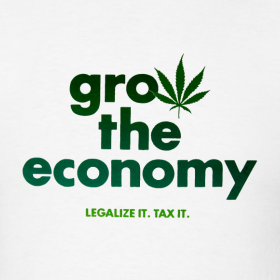What exactly comes to mind when you think of crime? Stealing a car, robbing a bank, maybe faking an identity? How about consuming a drug whose health consequences are believed to be much less severe than alcohol?
Marijuana has made its way back into the headlines this past week after an interview with President Obama. In the interview, the President expressed his belief that Marijuana is no worse than alcohol. The interview raises the question: Should marijuana be legalized? Do the benefits outweigh the risks?
It is no secret that marijuana is a big part of our culture. Over 40% of Americans have tried marijuana at some point in their lives, and millions are current users of the drug. Out of the estimated 1,531,251 drug arrests in 2012, 48.3% were due to marijuana offenses. Statistically every 48 seconds, an arrest was made for marijuana possession that year (and every 42 seconds in the year prior). Despite its illegality, people have been using it for years and will continue to use pot whether or not it is legal. A similar dilemma was faced during the early 1900s in this country, when the 18th amendment was passed banning alcohol. Crime rates and arrests increased; however, consumption of alcohol never decreased (it actually increased). When asked about the correlation between the ban of alcohol and ban of marijuana in certain states, an unnamed freshmen expressed, “I think it’s exactly like prohibition…And even though it’s illegal, people still have it and use it so making it legal would definitely be beneficial.” On top of that, marijuana convictions can severely damage one’s reputation. Permanent drug arrest records can easily be accessed by future employers, landlords, schools, credit agencies, licensing boards, and banks, having negative long term effects on victims. If marijuana was legalized, it eliminates these concerns, which is most definitely true for young African-Americans who are more easily targeted and arrested than young Caucasians at triple the rate (despite the fact that whites use marijuana at higher rates).
As more states are headed toward legalizing marijuana, President Obama has stated that he believes the harmful effects of marijuana have been exaggerated. Toxic substances like alcohol and cigarettes are legal and available to anyone of age. However, alcohol is more toxic, addictive, harmful to the body, and is linked to cancer, damages the brain, is more likely to result in injuries, and is more likely to lead to interpersonal violence than marijuana. Cigarette smoking is the leading cause of preventable death in the United States, with more than 440,000 deaths a year. When asked about her views on other extremely harmful drugs being legal and marijuana being banned, freshman Zina Miqdadi expresses, “If you want to justify the outlawing of marijuana, a substance that, when regulated and used correctly, can be utilized for medical purposes to save lives and cure diseases, then take a look at cigarettes- something that has no beneficial purposes and has been known to cause cancer and other harmful aliments.” Although no drugs are good, and the best lifestyle is definitely a drug free one, many effects of marijuana are short term, and it is impossible to overdose, in comparison to more dangerous drugs like cigarettes and alcohol.
Selling and taxing marijuana could also be beneficial to the economy, while decreasing crime as well. Profit and tax of marijuana could go to the state, instead of drug dealers, which could increase funding for things like education and construction. When asked about her opinion on the possible economic effects marijuana could have on the economy, freshman Maggie Verrico responded, “I think marijuana should be legalized for many reasons, mostly because a) It is really helpful, and b) if we were to tax it, the US could make a lot of money.” Researchers predict that the newly legal recreational sales in Colorado will add $359 million to the economy, and $208 to Washington.
However, there are always risk factors and costs that come with the legalization of any drug. Factors such as increased rate of auto accidents/ deaths from driving under the influence, arriving at work intoxicated, which could increase injuries and accidents, and increasing numbers of people moving on to more powerful drugs (marijuana serving as a gateway), are all possibilities to keep in mind.
Legalizing marijuana comes with its benefits and risks. It is yet to be seen whether the benefits will outweigh the costs, in places like Colorado and Washington where marijuana has newly become legalized. Perhaps there is no perfect solution; time may provide answers in the future and allow us to reevaluate.


I think several states are watching Colorado and Washington to see the effects of making it legally.
Comments are closed.